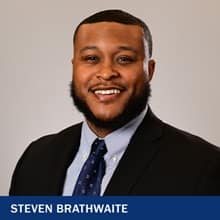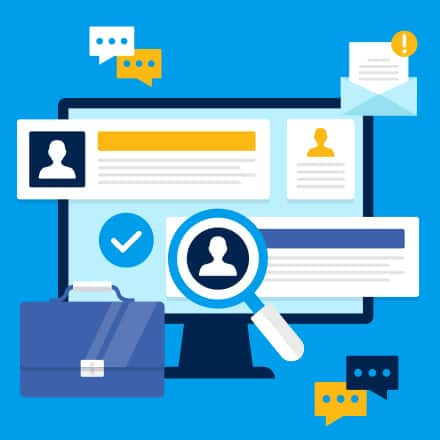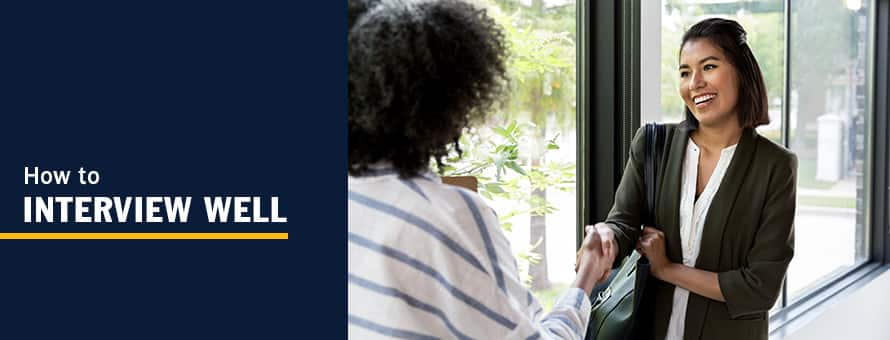How to Prepare for an Interview
Congratulations! You just got a call from the organization you want to work for, and they want to set up an interview for later this week.
But is that enough time for you to prepare? Can you get everything in order in time to make a great impression?
The answer is a resounding yes.
Learn a few tips on how to prepare for your job interview from some professional career advisors.
You've Got an Interview. Now What?
First thing's first: Confirm that interview.

"Understand who you'll be meeting with and what the interview process is," said Bonnie Ward, a career advisor at Southern New Hampshire University (SNHU).
Then, it's time to do your research. Sure, you probably did some before applying for the role, but now it's time to dig deeper.
"As soon as you get the call or email saying you have been chosen for an interview, the first thing to do is do some more research into the position you applied for," said Steven Brathwaite, a career advisor at SNHU. "Companies will know if your interest and energy are off in the interview or if you’re not fully invested in the position. Start to get into the mindset of what it will take day in and day out to be successful in that role."
And it's not only the job you'll want to learn more about. Use this time to find out as much as you can about the organization.
"Research the company to find out the latest news to understand what problems they're facing or their concerns and celebrations," Ward said.
Ward said that includes:
- Checking the company website and social media platforms.
- Looking up notes from annual meetings.
- Understanding the corporate vision, culture, and products or services.
- Going on LinkedIn to research who you're interviewing with, as well as to see if you have a connection that works there.
This is also a good time to look more closely at yourself, Ward said. Specifically, take a look at your personal brand and how you are portrayed online.
"Make sure your LinkedIn, Facebook, Twitter accounts are professional and Google yourself to see what comes up," she said. "The interview team will most likely be checking you out."

How to Prepare for a Job Interview the Night Before
To make that good impression on your could-be employers, it's crucial to be prepared for what they might ask you.

"Discover why you want to work there, what really draws your interest to the organization," said Christopher Dodds, a career advisor at SNHU. "Try to create some parallels between that company and what they value and what their mission is."
Of course, you'll want to study some standard interview questions that are often asked in these situations. Google this, and you'll find millions of results – though what you find on the first page is probably pretty good.
"Write down some talking points in Q and A format," said Cathy Montanarella, a career advisor at SNHU. "Prepare 3 examples of situations or challenges that have come up at work and be able to explain succinctly how you handled them in the past."
In an interview, you need to get into the mindset of the other person's shoes.
"Think like a hiring manager," Montanarella said. "'What are the skills I need this person to demonstrate they have? What are the problems they can solve for my work team? Are they likable and low maintenance?'"
You may also want to study the job description a little more – so that you have a better understanding of the role's responsibilities and so you can make sure what you bring to the table matches up well. Knowing what an employer is looking for can help you develop a relevant elevator pitch, too.
"Be very intentional in reading the job posting in detail and framing your interview responses to align with those job responsibilities," Montanarella said.
Aside from preparing answers to the questions you're expecting at the interview, there's one more detail that's important: Getting there.
"Most importantly, the day before – if it's an in-person interview – make sure to do a test drive of the route so you know exactly where you are going," Brathwaite said. This is key if the directions take you through a road construction area or if it's during rush hour: You don't want to be late to the interview for something you could have avoided.
There's plenty of information you could fill your brain with prior to an interview. But that doesn't mean you should.
"Prepare as much as you can, but don't overprepare," Dodds said. "Know your limits with preparation. But if you're getting a little bit burned out from that preparation, just stop and focus on relaxing before the interview. We don't want you going into the interview stressed out. We definitely want you going in with a good night's rest and feeling relaxed."
How to Dress for a Job Interview
The night before the interview is also the time to choose your outfit for the next day.

"For today’s interviews, you should be wearing professional/business attire," Brathwaite said. "For men, this would mean a suit jacket with slacks and a button-down with a tie. For women, this would mean a blouse/and or dress pants and a blazer."
Of course, there will be the occasional role where you think getting dressed up might not be the right image.
"I would call your HR contact in advance and ask if a suit is appropriate attire," Montanarella said.
But if you can't get in touch with that person, it's "better to be dressed more formally than casually," Ward said. "People know that it's an interview."
What to Bring – and What You Should Not Bring – to an Interview
"You should bring a professional folder, and within that folder, you should have a few copies of your resume and some paper so you can write down information," Brathwaite said. "Also, be sure to bring a few black or blue pens so you don’t need to ask the interviewer for one."
Ward agrees with the importance of taking notes during the interview. "I usually coach people to ask the interviewer if it’s OK to take some notes," she said.
What you'll want to write down may include the names and emails of the individuals who are interviewing you and any questions that may come to mind during your interview, Brathwaite said.
And what else should be in your folder?
"Bring your references – just in case they do ask for them – on a separate sheet," Dodds said. "That's something that's super important as well."
In addition, you may also choose to pack "any certificates, awards, trainings or samples of work you would like to share that demonstrates your ability, like a portfolio," Ward said.
Finally, Montanarella also suggests packing mints, which are always good to have when you're trying to make a good impression anywhere.
Then there's what you shouldn't bring to an interview.
"Don't bring a purse," Montanarella said. "It's too clumsy and you don't need it. Also, no gum and no coffee."
Some career advisors also suggest not bringing your cell phone into an interview – but if you must, turn it completely off or ensure it's set to silent.
Dodds also recommends not bringing other people.
"I wouldn't bring anybody with you," he said. "I remember as a recruiter, I used to have people bring their friends who would sit in the waiting room. If a friend drives you, just have them wait in the car. You'll also want to have your childcare organized by the night before."
Overall, it's most important to bring the best version of yourself, Ward said. That includes:
- Your ears, to actively listen.
- Your smile, to show enthusiasm and warmth.
- Your eyes, to connect.
- Your good posture, to show professionalism.
- And your words, to speak clearly and concisely.
This is It: It's the Morning of Your Interview
"Get excited for this opportunity!" Montanarella said.
After all, the company chose you for an interview. They are just as excited to find the right person for the job.
This is the time to "say to yourself, 'I have 50% of the power in this interview,'" Montanarella said. "'I am evaluating the employer just like the employer is evaluating me. It must be a mutual win for both of us. This is a discussion, not a test.'”
Keep your morning rituals as close as possible to what you'd do every other morning. Now isn't the time to make changes.
"Make sure to stick to your normal routine," Dodds said. "Don't go too far out of the ordinary, because that's when we start to forget things. ... Eat a good breakfast – but not too much, because you don't want to feel too full going into an interview."
You may also want to take this time to envision yourself being successful in the interview, Ward said.
"Know that you have prepared and have confidence – know that everyone gets nervous," she said. "Just be yourself, breathe and have fun."
Get There Early. But Not Too Early
Brathwaite, Montanarella and Ward all agree that arriving somewhere between 5 and 15 minutes early is plenty for an interview. If you arrive earlier than that – which isn't necessarily a bad thing – it makes more sense to stay in your car.
Arriving extra early could also give you time to "observe the lobby and people in the company," Ward said. "You may even have time to meet other employees as they pass through the area."
It may even give you time to go to the restroom and double-check your appearance, Ward said.
But checking in before 15 minutes is a definite no.
"You don't want to show up too early," Dodds said. "I used to see people show up a half-hour, 45 minutes early – that's really early for an interview. I appreciated the promptness, but they were sitting there for quite a while, which, when we sit there, we're kind of stewing on our own thoughts, it makes us a little bit nervous."
And not only can that be a problem for the interviewee, but it also could rattle the interviewer.
"It might disrupt the recruiter or the hiring manager's day, which can be a negative reflection, as well," Dodds said.
Is it Okay to Read from Notes During an Interview?
Yes. And no.

"Reading from notes isn't best, but you can definitely glance at your notes and reference them during the interview," Montanarella said. "Be sure to look up while asking and answering questions to make good eye contact."
Brathwaite also said that your notes can contain a list of questions that you have for the interviewers.
"Doing this actually shows to the interviewer that you are well prepared and fully invested in the potential position," he said.
However, there is definitely a limit as to how much you can look down at those notes.
"It’s not acceptable to read from notes when you are trying to answer open-ended questions," Brathwaite said. "If they ask any open-ended questions, you need to be able to answer those questions without any help and especially without looking at any notes."
If you think you'd be looking at your notes too much during an interview, then it might be time to prep a little more. You also want to keep your notes as short as possible.
"Interviews are stressful enough ... and that's where that prep and research can come in to play the night before," Dodds said. "(Notes) can help you feel more confident in the interview," but they shouldn't be a replacement for what you know, he said.
How Long Does a Good Interview Last?
There's really not just one answer on how long a good interview will last.
Because of that, make sure to "be flexible, and plan to add more time to your interview in case they want you to meet with others or take you on a tour," Ward said.
But length doesn't always determine if an interview is going well.
"Here’s a clue," Montanarella said. "If the tone of the interview is conversational and you and the interviewer are exchanging information back and forth in a relaxed manner, that's a good sign you are establishing rapport with the interviewer. ... Typically, the longer an interview runs, the better it is going."
There are other aspects to think about regarding interview length, though.
"The length of an interview will also depend on how high up of a role you are applying for," Brathwaite said. "Many senior-level interviews will most likely push the hour mark, where others will be less."
How to Prepare for a Videoconference Interview
Some aspects will stay the same. You'll want to wear a professional outfit. You'll schedule a time to meet. And you can have your notes with you.
But there are a few others you'll want to keep in mind.
"Be sure the area behind your computer is well lit and neat," Montanarella said, so you can give off a professional vibe at home.
"Make sure you have a quiet space and good internet connection," Ward said.
And regarding your computer, be sure everything you need is actually working.
"Always, always, always make sure that you test your technology – if you're doing a video interview – the day before," Dodds said. "Make sure that you have the Zoom link that you need, or the Microsoft Teams link or whatever software the company is using. That way, you don't find out 10 minutes before the interview that your camera's not working or your computer isn't charged."
Dodds said this will be more necessary in the future, especially since virtual interviews are already becoming more common in the job market.
Because of that, you'll want to start working on your on-camera skills anyway.
"It's important to practice interviewing and talking to the camera," Ward said. "Keep your eyes to the camera and smile!"
And, Finally...
Remember why you're doing all this preparation before your interview.
"It's all about minimizing stress on interview day," Dodds said.
Nerves aren't a bad thing, he said. Dodds likes to think that they're good, because it shows you want the position.
"Recognize that nerves are completely normal, but what can manage those nerves is the preparation and believing in your skill set," Dodds said.
Deidre Ashe '18G is a copywriter in higher education. Connect with her on LinkedIn.
Explore more content like this article

From Application to Offer: 5 Steps on How to Get the Job

Curriculum Vitae (CV) vs. Resume: What's the Difference?

The Day 1 Advantage at SNHU: Career Support from the Start
About Southern New Hampshire University

SNHU is a nonprofit, accredited university with a mission to make high-quality education more accessible and affordable for everyone.
Founded in 1932, and online since 1995, we’ve helped countless students reach their goals with flexible, career-focused programs. Our 300-acre campus in Manchester, NH is home to over 3,000 students, and we serve over 135,000 students online. Visit our about SNHU page to learn more about our mission, accreditations, leadership team, national recognitions and awards.


